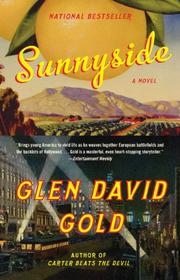

SUNNYSIDE
by Glen David Gold
A big, splashy novel about a little, splashy subject: Charlie Chaplin, the original movie star.
Gold (Carter Beats the Devil, 2001) takes on much more than the Little Tramp, however. His narrative is set against the broad canvas of the First World War era, with appropriately attendant surrealist moments, as when the German Kaiser marvels at a Wild West show staged by one Duncan Cody, then worries that he will one day have to be fighting these savage Americans, only to be consoled, “Er ist nicht Buffalo Bill.” Chaplin, for his part, enjoys the occasional quiet getaway, which nearly earns him a drowning off the wild coast of Northern California but instead results in the acquaintanceship of some fine but never ordinary folk, all of whose stories intertwine with his and wander even farther afield—among other destinations, to northern Russia, where an American expeditionary force landed after the Bolsheviks came to power, ostensibly to secure American materiel but in fact to fight the Reds on their home turf. (“Why am I here?” ponders one soldier, a movie buff. “Where am I? And why do we have overcoats? I am depressed.”) Gold hits a promising scenario with that adventurist debacle, but he doesn’t quite work it for all it’s worth, since his story requires travel elsewhere while Chaplin attempts to make a doomed film called, yes, Sunnyside—doomed because, then as always, the suits got in the way. (“The kingpins of the industry, having taken the measure of the situation, finally brought their plans to fruition, with the result of stopping Charlie Chaplin dead in his tracks.”) Gold’s tale strains from overreach now and again, but that is the price one pays for such ambition—and this is an ambitious, very well-written book full of memorable moments, not least of them starring Rin Tin Tin.
Historical but not didactic, in the manner of the master of the genre, E.L. Doctorow, and more completely realized than Gold’s debut.